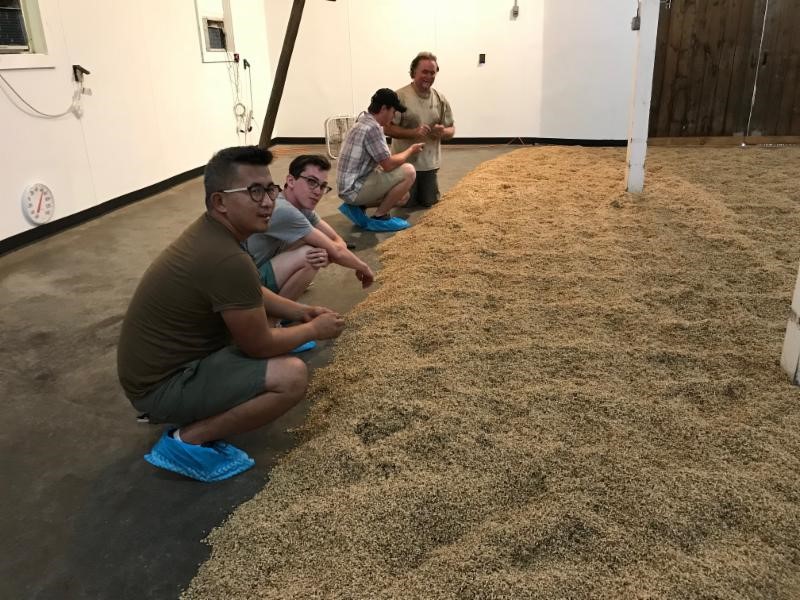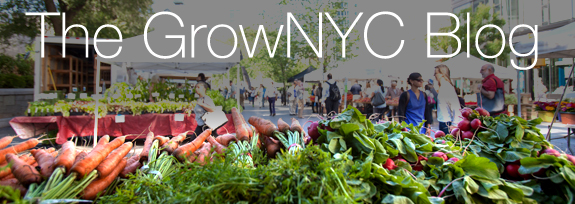On the Road With Our Grains Team!
This July, GrowNYC's Grains team set out on the open road to explore the innovative ways farmers, brewers, and bakers are incorporating the burgeoning bounty of northeastern grains into their breads, beers, and fields. For this trip, we focused on the Hudson Valley, diving deep into the grains scene of Columbia and Greene counties.
Our first stop was at Migliorelli Farm, which was one of the last farms to operate in New York City. As a child, Ken Migliorelli first learned farming in the Bronx, where Co-op city now stands. In the late 1950's, his father moved the family to Tivoli, NY in Columbia County where Ken still manages the original farm (plus an additional 900 acres). Migliorelli farm stands dot the mid-Hudson Valley, and Ken sells his acclaimed fruits and vegetables at 12 GrowNYC Greenmarkets. As he walked us through his barley and rye fields, Ken explained how he originally tried growing grain when Greenmarket first required bakers to use 15% local grain, but he struggled with fusarium head blight. Over the years, he has found a stable market for barley and rye with distillers and brewers like Coppersea, who use Migliorelli rye for their Empire Rye. Ken also established his own on-farm brewery, From the Ground, with brew master Jake Cirell, and he sells grains for animal feed to Quattro's Game Farm, a Greenmarket poultry producer.
Dirt hounds take note: since adding small grains to his rotations, Ken's soil organic matter has increased by a whopping 1.5-3%. Excellent! Proof that partaking in a NYS beer or cocktail helps establish a more sustainable local food system. Cheers!
Next, we crossed the Hudson River to Sfoglini's new facility in West Coxsackie, NY. Two tiny pasta machines (the ones they began with in Brooklyn’s Pfizer Building back in 2013) were tucked into a corner of the vast, re-purposed aerospace facility. Colorful pastas--flavored with beets, mint, and sriracha--draped on industrial pasta dryers lined the walls. Sfoglini co-founder Steve Gonzalez told us about their recent expansion, including a $2.5 million round of investment and nationwide distribution through Whole Foods. Sfolglini remains committed to local growers; in fact, this commitment was something that attracted investors. In the last year, over 60,000 pounds of local flour (mostly from Farmer Ground Flour) went into their pastas. The company is now poised to grow with the Northeast grainshed.
The next day began with a much anticipated tour of Stone House Farm, a network of projects developed and supported by Peggy McGrath Rockefeller and her children. We stopped by Sparrowbush Bakery just as owner Antoine Guerlaine and his family were unpacking loads of new proofing baskets in preparation for their first full scale bake. Antoine, who baked previously for Camphill Village, is setting up shop as an extension of his partner Ashley’s operation, Sparrowbush Farm. We can't wait to try Sparrowbush Breads!
On the other side of the property, David Goldstein runs the onsite Hudson Valley Carbon Lab. David explained the six year rotation program they use to build soil and measure carbon capture. Stone House has a major research component with a mission to gather hard data on the impact of cover crops. David also showed us “Hudson Hemp,” a state sponsored pilot program to grow fiber and CBD hemp at the farm.
Ben Dobson, the Farm Manager of Stone House Farm, then gave us a whirlwind tour of the farm's grain operation, that included fields of barley, rye, AC Morley, and Glenn wheat, with a pair of towering combines that is the base of the operation. Stone house has become both a source for farmers looking for organic feed, as well as an important resource for learning and research. Dobsen now growing grains for brewers and distillers, and he’s preparing to grow food and baking grade grains in the future.

Our last stop was at Hudson Valley Malt. In 2014, Dennis and Jeanette Nesel launched the malt house, one of the few floor malting facilities operating in the country. Dennis believes this technique makes for superior malt flavor. Standing amid a rolling landscape of sprouted barley, Dennis walked us through the intricacies of the malting process, from soaking the grain, to letting it dry and cool, and then roasting it to bring out unique and delicate flavors. Dennis, who still works in finance (though it’s hard to tell which is the side gig), loves being the middle-man. He explained to us how growing malting barley gives barley farmers an additional revenue stream. The Nesels' have contracts with 24 breweries and four distilleries, including Migliorelli’s “From The Ground Brewery.” Dennis has one goal for all of them: “I want to be their secret weapon!”
Recent Posts
- GrowNYC Publishes 2023 Impact Report
- 2024 Seasonal Greenmarkets and Farmstands Opening!
- GrowNYC's 2024 Plant Sale
- Use Pandemic EBT (P-EBT) with GrowNYC
- The 2024 Health Bucks are now available!
- Sign Our Petition: Save Community Composting
- 2023 Holiday Schedule - Greenmarkets, Farmstands, Food Scrap and Clothing Collections
- Deck the Halls - 2023 Greenmarket Gift Guide & Christmas Trees + Holiday Wreaths at Greenmarkets
- GrowNYC Weather & Site Closures
- Thanksgiving Week Schedule 2023 - Greenmarkets, Farmstands, Compost
Tags
- Grains
- compost
- recycle
- recycling
- greenmarket
- kids
- union square
- swap
- youthmarket
- grow to learn
- learn it grow it eat it
- reuse
Archives
- April 2024 (1)
- March 2024 (2)
- February 2024 (1)
- December 2023 (1)
- November 2023 (3)
- October 2023 (5)
- May 2023 (1)
- April 2023 (2)
- December 2022 (1)
- November 2022 (3)
- September 2022 (1)
- June 2022 (1)
- April 2022 (2)
- March 2022 (2)
- December 2021 (2)
- November 2021 (1)
- October 2021 (3)
- September 2021 (3)
- August 2021 (2)
- June 2021 (3)
- May 2021 (1)
- April 2021 (1)
- March 2021 (1)
- January 2021 (8)
- December 2020 (2)
- October 2020 (3)
- July 2020 (1)
- June 2020 (2)
- March 2020 (6)
- February 2020 (3)
- January 2020 (2)
- December 2019 (2)
- November 2019 (1)
- October 2019 (1)
- September 2019 (7)
- July 2019 (4)
- June 2019 (1)
- May 2019 (1)
- April 2019 (3)
- March 2019 (4)
- February 2019 (3)
- January 2019 (3)
- November 2018 (3)
- October 2018 (3)
- September 2018 (1)
- August 2018 (2)
- July 2018 (4)
- June 2018 (5)
- May 2018 (1)
- April 2018 (1)
- February 2018 (3)
- December 2017 (2)
- November 2017 (3)
- October 2017 (7)
- September 2017 (4)
- August 2017 (3)
- July 2017 (1)
- June 2017 (2)
- May 2017 (4)
- April 2017 (1)
- March 2017 (2)
- February 2017 (2)
- January 2017 (3)
- November 2016 (1)
- August 2016 (1)
- July 2016 (4)
- April 2016 (2)
- March 2016 (4)
- February 2016 (2)
- January 2016 (1)
- December 2015 (4)
- November 2015 (2)
- October 2015 (2)
- September 2015 (4)
- August 2015 (2)
- July 2015 (2)
- June 2015 (3)
- May 2015 (2)
- April 2015 (2)
- March 2015 (1)
- February 2015 (2)
- January 2015 (2)
- December 2014 (3)
- November 2014 (5)
- October 2014 (3)
- September 2014 (3)
- August 2014 (3)
- July 2014 (3)
- June 2014 (2)
- May 2014 (5)
- April 2014 (4)
- March 2014 (2)
- February 2014 (3)
- January 2014 (1)
- December 2013 (4)
- November 2013 (3)
- October 2013 (5)
- September 2013 (4)
- August 2013 (2)
- July 2013 (4)
- June 2013 (2)
- March 2013 (2)
- February 2013 (2)
- January 2013 (2)
- December 2012 (3)
- November 2012 (2)
- October 2012 (3)
- September 2012 (2)
- August 2012 (5)
- July 2012 (4)
- June 2012 (3)
- May 2012 (2)
- April 2012 (4)
- March 2012 (7)
- February 2012 (5)
- January 2012 (9)
- November 2011 (7)
- October 2011 (4)
- September 2011 (2)
- August 2011 (7)
- July 2011 (4)
- June 2011 (2)
- May 2011 (4)
- April 2011 (3)
- March 2011 (5)
- February 2011 (3)
- January 2011 (5)
- December 2010 (5)
- November 2010 (7)
- October 2010 (6)
- August 2010 (1)
- June 2009 (1)
- May 2009 (1)
- March 2009 (1)
- November 2008 (2)
- August 2008 (1)






